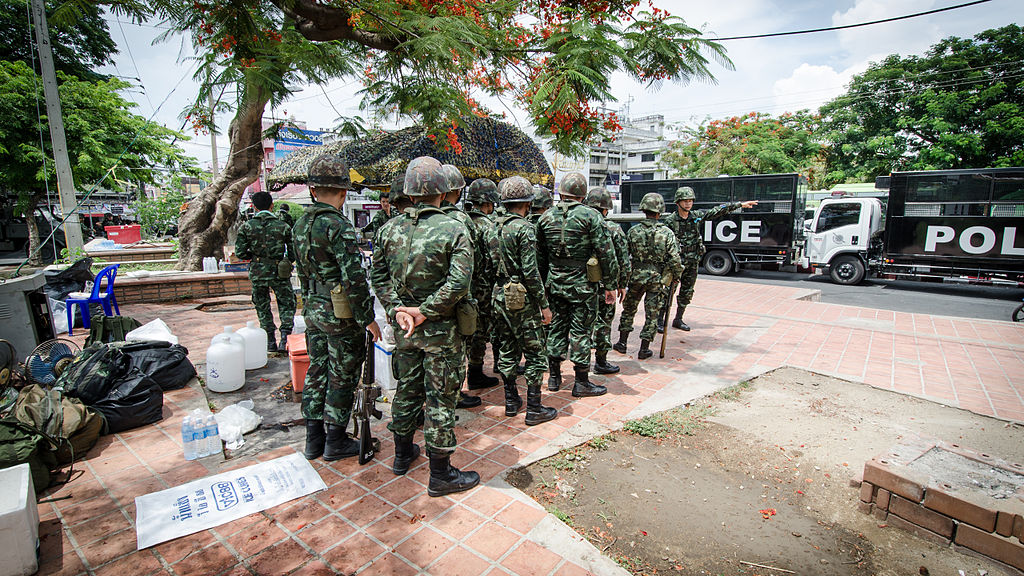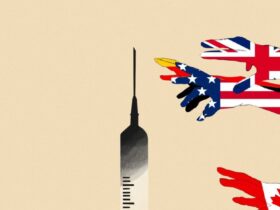“This article is part of a face-off with The Algerian, an online international affairs publication based at The Ohio State University. To read the counter argument, click here.”

When scholars talk about political revolutions happening overnight, they usually speak figuratively. And yet, at 3am on May 22nd, Thailand suddenly became a military dictatorship.
Yingluck Shinawatra, who was elected Prime Minister of Thailand in 2011, had been removed days earlier by court order. The Thai military, led by Gen. Prayuth Chan-Ocha, took over on May 22nd and created a junta, the National Council for Peace and Order (NCPO), to rule the country. Thai citizens awoke to tanks on street corners.
The most recent takeover is the 18th successful coup since 1932, when Thailand became a Constitutional Monarchy. This is largely a result of the military’s large role in the political sphere combined with the constant failure of democracy to flourish in a meaningful capacity.
The United States should maintain aggressive responses to dictatorships like the NCPO in Thailand. The dictatorship in Thailand might not be incredibly violent or pose a large threat to the United States, but as a matter of principle and establishing credibility to deal with actors that are violent and threatening, the dictatorship in Thailand should be opposed with equal force.
One of the first things Congress should do upon their return is to revoke all military aid unless things change for the better. Each year, Thailand receives $10.5 million in “security-based” foreign aid, an umbrella term that includes military and direct economic aid. Thus far, the strongest signal the US has sent the new dictatorship is cutting only $3.5 million in “Foreign Military Financing (FMF) and International Military Education and Training (IMET) funds.” Cutting health, counterterrorism and nonproliferation aid, which the country also receives, is less important. North Korea, for example, receives food aid from the United States for fear that its people will starve otherwise. But strong reasons remain for the continued suspension of military exercises and aid: it is ethical, required by law and proven to be effective at deposing the military dictatorship.
The ruling military government has shown a complete disregard for democratic freedoms. They engaged in a full-scale censorship campaign that includes removing former leaders’ names from new editions of history books. Additionally, The official in charge says the removal is an unexplained mistake. The country now joins China and North Korea in the circle of Asian countries who have vied to erase past leaders from the historical record.
Additionally, the NCPO upheld a prohibition on all forms of government criticism. In the months since, organizations like Human Rights Watch have detailed the detention of over 300 opposition party leaders and activists and the massive censorship over the media. Those detained included Kritsuda Khunasen, an opposition leader who described being beaten until she lost consciousness during her one-month detention at a military camp. Actions punishable under lèse-majesté (a French term that refers to violating the dignity of the sovereign) law by a two-year prison term include playing the French national anthem, covering one’s mouth with duct tape and reading 1984 in public.
How can the United States consistently and credibly oppose human rights violations at the hands of actors such as IS, North Korea and Syria (none of which receive security-based aid), if we continue to prop up Thailand? Not only will the countries we do decide to forcefully oppose take our actions and threats less seriously, but we will also be unable to convince allies and international partners to join us in that opposition if we selectively ignore the actions of small nations like Thailand. Though small, the effectiveness of United States diplomacy and soft power will be particularly reduced in the ASEAN region, a critical area for US geostrategy.
Irrespective of the treatment of Thai citizens and ethical questions, the Congressional 1961 Foreign Assistance Act requires the suspension of aid. In section 508, in no uncertain terms, the law mandates that the US cut aid to any nation where a “duly elected head of government is deposed by military coup,” pending the return of civilian rule. This policy was strengthened to include countries that commit human rights violations by the Leahy Amendments, which were passed in 2008. In the past, the US has evaded the law’s mandate by refusing to dub certain overthrows as “coups,” most recently in the case of Egypt. But even Egypt eventually saw its entire security aid budget disappear as the nation descended further into chaos, and so too should it be in the case of Thailand.
Proponents of maintaining some aid cite diplomacy as a more credible approach than sanctions, especially with a nation like Thailand, which remains a military partner in Asia for huge naval exercises like Cobra Gold, which plays a large role in East Asian readiness. However, this is a feckless strategy that ignores recent history: the total suspension ($29 million worth, compared to the $3 million that’s been suspended since May) of development and military aid in 2006 (health and counterterrorism aid were some of the few projects that were understandably maintained) led to the end of military rule in just 18 months, and even some scholars say that action wasn’t harsh enough.
The central tension at home seems to be between think tanks and the State Department on one side – who, today as in 2006, favor further aid restrictions and the cessation of military exercises – and the military, which has historically been vulnerable to threats from the Thai military to move closer to China in the event of an aid cutoff, and thus more willing to support continued military engagement. Those defense officials, and, to some extent, high-level government officials like Secretary of State John Kerry, fear China will exert more influence over Thailand in the event of a suspension of ties. But the US can’t have its cake and eat it too. As long as the historical record shows that the suspension of aid has been successful in restoring civilian rule in Thailand, that is the policy that should be maintained: supporting a military dictatorship and clinging to an outdated, Cold War-era military posturing strategy should not.
The views expressed by the author do not necessarily reflect those of the Glimpse from the Globe staff, editors, or governors.








